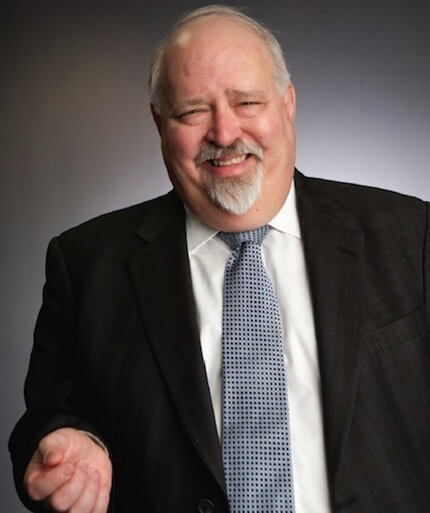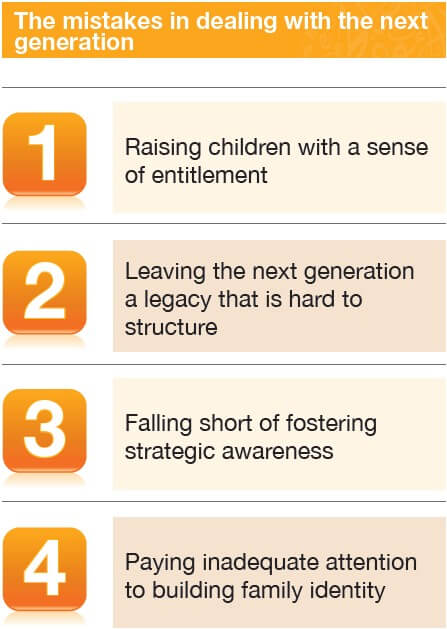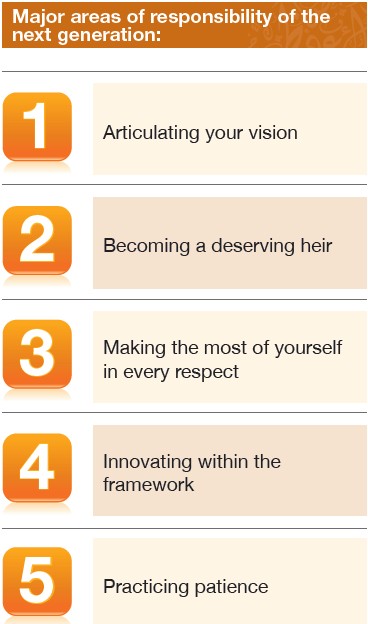Prof. Craig Aronoff has been in the family business field for near to 40 years. In 1994, he established together with family business pioneer and colleague Prof. John Ward the Chicago-based Family Business Consulting Group, which grew to be a hub of family business experts, serving family businesses in the US and internationally. Aside the vast amount of written material that Prof. Aronoff has produced over the years as an academic and consultant, he has also worked with hundreds of business families. Tharawat magazine taps into his extensive knowledge and finds out more about him, the agenda he sets for family businesses today, and his recommendations to the next generation.
Craig Aronoff was born the eldest of three children in Atlanta, Georgia. In his youth, Craig used to help out in his father’s small entreprise. Looking back at that time he confesses: “It became clear to me by the age of twelve that I would not join my father’s business. I started to make plans to leave for college when I was still in 8th grade and that is what I did.” Craig Aronoff became a business management professor, teaching organisational behaviour, theory, and communication for many years.When we hint at his reputation as one of the pioneers in family business research and education, Prof. Aronoff modestly replies that family businesses have always been of interest to many but that the subject had been neglected mid-20th century, when researchers steered their focus towards the management of multinational corporations: “Everyone was serving primarily large public corporations and moved away from helping individuals developing resources for their families and communities. I feel that we have gotten back to a more traditional view nowadays.”, he says and confirms our belief that looking at the family business model is more relevant today than ever. In 1994, together with Prof. John Ward, he founded The Family Business Consulting Group, Inc. resulting in his collaboration with hundreds of families all over the world.
The Relevance of Family Businesses
The role of family businesses remains undiminished in today’s economies: They are often principal job creators and community benefactors. “I think it has always been the role of family businesses to act in a way that is responsive not only to the economic but to the social and cultural needs of their communities. A business family’s view on making money tends to be fundamentally different from that of non-family corporations. When a family business is successful, it becomes all about taking responsibility and assuming stewardship.”, adds Prof. Aronoff. It is why, even after several decades, he continues to enjoy his work with business families.
Studies show that many of the largest businesses in the world are or at least started out as family businesses. “Economies should really be looked at as stools with three legs: Governments, publicly traded enterprises, and privately owned entreprises.” Prof. Aronoff declares. “Such a stool can be awfully wobbly if the latter leg is not there and in an economic era like the present we feel this keenly.” He adds that in times of crisis family businesses tend to be more people oriented and are known to retain staff in spite of down-turns; a strategy that is shown to be rewarding when economic times improve.

The Changes in Understanding the Family Business
Like any other discipline, the family business field and best practice has changed considerably over the years. When we ask Prof. Aronoff about this, however, he underlines, that it is more likely that it is our understanding of family firms that has evolved rather than they in themselves. In his decades of experience, he has seen the family business practice focus shift from a management to an ownership and family relationships related approach. According to Prof. Aronoff, the priorities for family businesses nowadays are the following:
a) Understanding what it means to be owners.
b) Having a vision as owners and agreeing on values and goals by learning to speak in one voice.
c) The setting up of a good governance structure.
d) Assuring outstanding leadership for the family and the business.
e) Developing policies for the integration of the next generation.
Prof. Aronoff further elaborates: “Our understanding of how the family business works is broader and more systemic. It is not just reduced to picking the best manager or CEO. For example, I remember once working with the third generation of a family business; they were three cousins. The initial question that concerned the second generation was who should lead the business. I convinced the family to let the three cousins work together to articulate their visions for the company, their understanding of the relationship between the business and the family, and their view on governance structures. The three cousins came back to their elders with a 25-page document including their collective vision of the future. They had concluded that the issue wasn’t so much which one of them would become CEO, but rather the company’s ability to establish the right kind of business structures, vision, and goals in order for the family business to survive for many generations to come.”
The Mistakes in Dealing with the Next Generation
One of the main concerns for family businesses remains the successful handover to the next generation. When we ask Prof. Aronoff about the best-practice in successfully dealing with the next generation he argues: “Going out and accepting somebody else’s idea of best-practice means that you are resigning yourself from the beginning not to create the best practice for yourself. Rather than doing so I encourage anyone to observe what mistakes others make and to learn from them.” He identifies the following four major mistakes he has witnessed in family businesses dealing with the next generation:
The first mistake often happens in the early childhood of family members: If children are raised with a sense of entitlement and no understanding of hard work, things become tricky very early on. “Sometimes allowing your children to fail and learn how to overcome adversity can be greatly beneficial.”, underlines Prof. Aronoff. He adds that if children are raised believing that they are not accountable, it could lead to serious problems in the family business. “You can hire non-family CEOs and other executives and keep the business going to buy time, but you still need to develop the key qualities in family members if you want them to take responsibility.”
The second mistake Prof. Aronoff observes in business families, is to leave the next generation a legacy that is hard to structure. The founding generation often enjoys great autonomy. Founders tend to create high accountability for themselves but do not create management models that are easily replicable. The next generation is then confronted with the dilemma of deciding what structures to apply, which can lead to conflicts, as Prof. Aronoff emphasises: “This is usually a first to second generation, although sometimes even a second to third generation problem. One of the greatest mistakes that can be made with the next generation is to underestimate the importance of establishing a good governance system to make it possible for them to carry on the legacy. It is like setting them up to fail.”
The third mistake Prof. Aronoff describes as follows: “Founders or parent generations often have strategies, which though brilliant, are not clearly articulated. Formulating strategy is a meaningful process leading to better understanding your strengths, weaknesses, opportunities and threats. The discipline to implement and change your strategy is necessary.” According to Prof. Aronoff it is only through fostering this strategic awareness that a successful way of integrating the next generation into the family business can be found.
The fourth mistake is inadequate attention to building family identity, cohesiveness and teamwork. In sibling and cousin generations, family teams typically fulfill the responsibilities of governance and ownership and often, management as well.
How the Next Generation Can Make it Work
Equally important as avoiding the above mentioned mistakes, are recognising the responsibilities of the next generation members towards the family business. Prof. Aronoff defines five major areas of responsibility that the next generation should address to make it work:
1. Considering the multiplicity of roles and responsibilities any family business member faces, the right education is a key factor for the next generation to be successful. “How can you formulate your vision?”, Prof. Aronoff asks. “You do it by educating yourself, you do it by studying, you do it by thinking, you do it by interacting with other successful family businesses, and you do it by understanding the required compromise. And why do you have to do these things? To prepare yourself to articulate a vision for yourself and for your family business, which you’re going to be responsible for at some point.”
2. “You have got to show that you are a deserving heir,”, Prof. Aronoff begins emphatically, “and you have got to do that through mental labour: Work on gaining perspective, maturity and discipline as well as accountability. The combination of all these factors will not only preserve but advance the family business. It is about leadership in the business itself.” He mentions the great risk of ‘Successors, who want to be CEO, but don’t want to do CEO’: “They want all the perks and the status and respect, but they fail to understand that continuously building the family business and others commitment to it are huge responsibilities.”
3. The world continues to change at a fast pace and family businesses must change with it. The next generation holds a crucial role in this: “The world changes and we depend upon the youth to embrace and understand new technology and its implications. If they are really seeking to grasp how the world works, and how not only they themselves but their enterprises, resources, and assets can fit into it in a more productive way, family business continuity becomes more likely. As a next generation you need to find the motivation to want to make the most of yourself, understanding that you are potentially set up to have a great impact on the world, your community, and your family.”, stipulates Prof. Aronoff.
4. He goes on to explaining that, in order for the next generation to make things work, they should understand that family business values can be implemented in numerous different ways. Maintaining the family’s values does not mean that the next generation needs to deploy them in the same way as previous generations. “Being innovative within an existing framework is an art that the next generation needs to learn how to master. Those who succeed usually develop into leaders. It’s those who are kicking and screaming because they are not getting their way who will not make any progress. It is very much like achieving happiness: If you pursue it directly you don’t get it but if you pursue it indirectly it often becomes a by-product of all the other things that you are doing.”
5. “Then there is probably the most crucial factor to make it work in the family business.”, here Prof. Aronoff smiles indulgently. “Patience is what is hardest for the next generation, and it truly is very hard to be patient. I have been in a position to advise a number of people whose parents don’t seem to have the intention ever to retire. Sometimes these next generation members are in their 40ies and 50ies and want to know whether they should stay or whether they still should try themselves outside the family business.” Prof. Aronoff pauses, reflects, and then resumes: “Either decision is the right decision if you make it for the right reasons and either decision is the wrong decision if you make it for the wrong reasons.” He continues to explain that as a rule, if the next generation is not retiring by the time they are in their 70ies, he encourages the next generation members to go and talk with the older generation. “If the parent generation confirms that they do not intend to leave the business in the foreseeable future then a next generation member might want to consider what that means to them. They might want to join another organisation where they can provide leadership more directly. This can be done respectfully and without resentment towards the family business if everyone communicates successfully. There may always be a way back into the family business at a later stage. I recommend to be broad and flexible in your understanding of the roles in your family. Combine that with patience, communication, and taking responsibility for yourself. Don’t sit there and wait for life to happen to you. Done well, you can find success whichever decision you take.”
It Cannot Always Work Without Conflict
Many next generation members reading this will inevitably feel the urge to protest and say that they have tried to contribute in various ways but were either discouraged or the attempt resulted in conflict. We ask Prof. Aronoff whether he thinks that conflict can be avoided when next generation members try and make their mark in the family business: “I’m not sure if it can be accomplished without a little bit of conflict. Part of the strengthening process for the next generation is to learn how to intellectually confront their elders. I think that it can be done respectfully, and that the conflict is not necessarily a bad thing. You learn over time how to skilfully inject your own thinking into the family business.” Prof. Aronoff smiles affectionately when thinking of the family businesses he has worked with over the years and adds: “I agree that it is never simple or easy; but then again nothing worthwhile in this life ever is.”
Tharawat Magazine, Issue 15, 2012



















